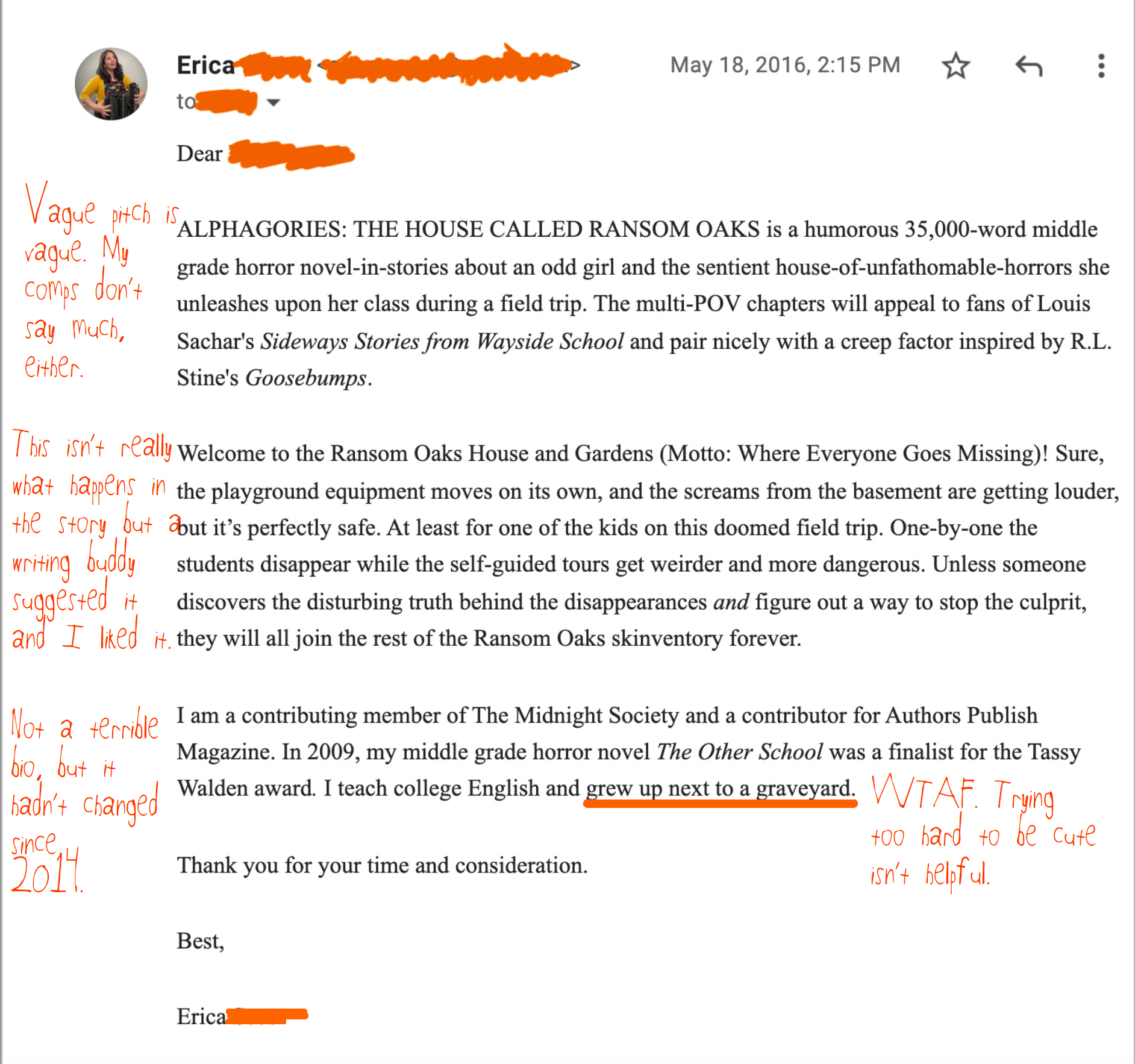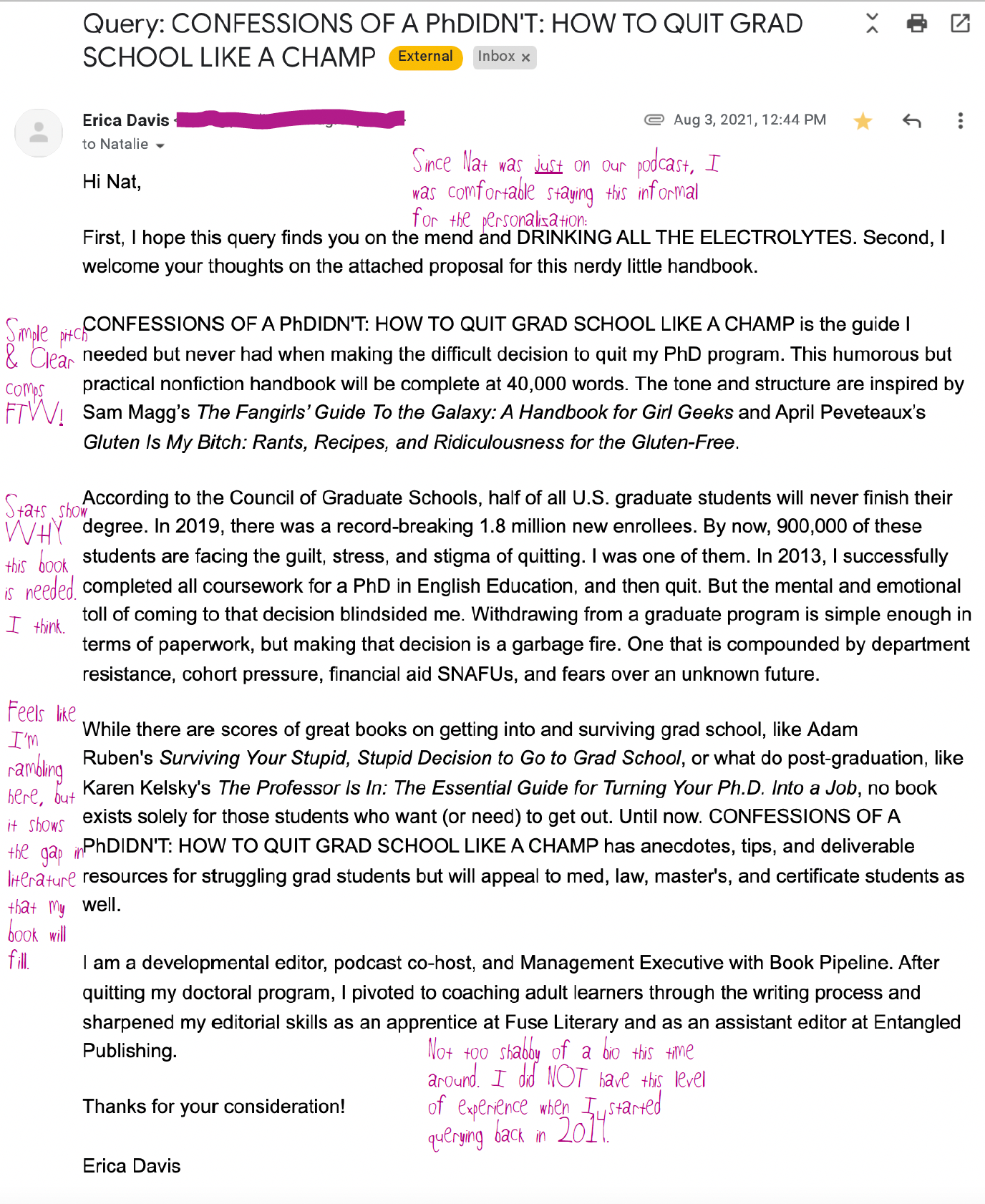
11 Querying Mistakes I Didn't Know I was Making Until I Worked at a Literary Agency
In early 2015, I knew something wasn’t working with my middle-grade horror manuscript. Or it could have been the query. Probably both, but I had no idea what. Frustrated, I shelved the manuscript, but a piece of me still wanted it to get better.
Since I’d already had more luck as a freelance editor than as a writer, I wondered if I’d be more successful as an editorial agent, too.
There was one way to find out.
After 18 months of applying for literary agency internships, junior positions, assistantships, and apprenticeships, I landed one.
The agent I reported to first familiarized me with their own practices, preferences, and habits for how to determine which queries get a full request, which get a partial request, which get a pass, and which get an instant pass (hint: any that did not follow the agent’s submission guidelines were an instant pass).
It made sense.
About fifteen minutes into my first shift, I realized I had made the right choice to shelve my middle-grade manuscript. The bulk of the mistakes I saw in the agent’s slush pile were easy to spot because I recognized them from my own query habits.

And if I had seen mine in that pile, it would have been a pass. So if anyone has a time machine, please send the following to 2015 Erica:
Mistake 1: Not personalizing my query letter.
I didn’t want to take up too much space or time, so my query started with my book stats like genre, word count, and comps, then went right into the pitch. I gave no indication of why I picked this agent. I didn’t know that was a thing.
Fix: You’ve picked that agent for a reason. Tell them. Did you see the agent’s Manuscript Wishlist (#MSWL) tweet? Do you appreciate their pet photos AND have a nonfiction proposal on how to photograph dogs in sweaters? Did something about their webinar on “Voice in Middle-Grade Horror” strike a chord with you? Tell them. Not only is this an instant clue that you’ve done your homework, but it also shows that you take yourself seriously because you’re taking them seriously.
Mistake 2: Querying before my manuscript was ready.
Of course I have sent a query for a manuscript that wasn’t ready yet.
Heck, I’ve sent a query for a book that wasn’t even written yet. I just wanted to know if it was a good idea or not. So, of course, I got a request for the full manuscript. And let me tell you, I felt like hot garbage.
Publishing is a very small room. Agents might see hundreds or thousands of queries each week, but they also have amazing memories and strong connections. The last thing you need is your dream agent remembering how they got ghosted by you and your killer idea.
Fix: Wait. Wait until your manuscript is ready. Wait until you’ve sent it to critique partners. Wait until you’ve revised so much that you want to set it on fire. Wait until you’ve sent it to beta readers and then revise it again. Revise it until all that you’re doing is shuffling punctuation marks. There’s no way to make your manuscript 100% perfect because "perfect" is some subjective nonsense, but it really does need to be as ready as possible if you want it taken seriously. I know this is easier said than done, but the closer your manuscript is to the best version of itself, the better your chances are for moving out of the querying trenches.
And yes, even after you sign with an agent, you’re still going to be revising. Trust me.
Mistake 3: Accidentally direct-messaging an agent on Twitter who I thought was my IRL childhood friend.
Not proud of this one. Look, 2010 Erica had a steep learning curve for Twitter. But I must have sounded creepy AF. My stomach still clenches thinking about it. Not to mention the hellish stories I’ve heard from agent-friends who have been trolled, harassed, and stalked by writers who wanted their attention.
Fix: Yeet myself into the sun. Then, be authentic when networking but keep it professional.
Mistake 4: Giving away too much or too little in my query letter’s pitch.
If your pitch doesn’t read like the jacket or back cover copy of your favorite book, it’s not there yet. Conversely, not showing enough of the plot flattens the whole effort.
Fix: Start a writing buddies group and swap queries. Get feedback from pro editors. Or sign up for Query Tracker. And if you don’t already know Query Shark, get familiar with it. Trust me.
Mistake 5: Skimping on my bio paragraph and/or including unhelpful info.
Unless the agent specifically requests that you NOT include a bio in your query, this is your chance to shine in a few sentences. But a lot of writers omit this—or put in something really unhelpful that they think is funny.
Fix: It does not matter if you don’t have any writing credits. Tell the agent a little about you or your background anyway, especially if your profession or hobby is related to something in the book you’re querying. Even something as simple as ‘This is my first novel’ will work. And maybe don’t mention that you grew up next to a graveyard. Your manuscript doesn’t even have a graveyard in it, Erica.
Mistake 6: Not double-checking the agent’s submission guidelines.
Yes, there are likely agency guidelines that you looked at weeks or months ago when you first decided to query this particular agent, but life happens. Agents close and re-open constantly, sometimes without warning. From the time I’d put an agent on my to-query spreadsheet until I felt ready, enough time had passed that I should have checked again if they were currently open for submissions. Or still representing my age category. Because a few times, they weren’t.
Fix: Check the agent’s submission guidelines again. Check the week before you query. Then check the morning of. While you’re there, make sure the agent still represents the age category and genre you’re submitting.
Mistake 7: Badly named attachments.
Some agents print pages, some read on screen, and some use e-readers. You can imagine how three dozen variations of “Final_Manuscript_Draft7.doc” are as helpful as they are descriptive when an agent is searching through submissions on their Kindle.
Fix: Keep it neutral and obvious like “LastName_Title.doc”. My current one is “Davis_ThePhDidntHandbook.doc.”
Mistake 8: Typos.
Look, I might be a decent developmental editor, but that does NOT mean I am a proofreader. I think a lot faster than I can type, especially if I am minutes away from hitting SEND on a query. Sometimes I’m just too excited to care.
Fix: Slow down. Ask someone to proofread your query. And for the love of all that is holy, double check your spelling of the agent’s name. And check their preferred pronouns. Many agents post their pronouns in their Twitter and/or agency website bios. Some even mention how they prefer to be addressed in a query.
Mistake 9: Half-assing my synopsis.
I might be a creative writer, but a synopsis is a very technical document. It serves a very specific purpose in publishing. And, once I figure out what that specific purpose is, I will write an article about it. Until then, take comfort in the knowledge that my middle-grade horror synopsis was an inflated but glittery version of my query pitch with a few more sentences slapped on it. And it failed gloriously.
Fix: Learn a few best practices for how to write a synopsis. I usually write at least two. One to tell myself the story in my earlier stages of drafting, and a second one later that will be seen by agents. There’s no one right way, but there are lots of wrong ways. This post by Jane Friedman is my first stop when I need to remember what my synopsis needs to accomplish.
Mistake 10: Assuming that an agent has to be THE perfect lifelong fit for me.
I don’t know how many queries I read that included a sentence or two on how the writer had amicably left their previous agent(s). I thought these professional bookish partnerships were for life. Now, I get that it’s OK if they aren’t. Again, life happens.
Fix: Accept that nothing is permanent in publishing. They’re not going to take away your birthday if you have to leave your agent, or if your agent leaves you. This happens a lot and for so many different reasons. And it’s OK.
Mistake 11: Assuming that querying was the only way to find my future agent.
About one out of every ten queries I read mentioned the writer’s personal connection with the agent from either a referral, a virtual pitch party like #DVPit, #PitMad, #PitDark, or #PitchWars, or a writing conference. Heck, I inadvertently pitched my long-since-shelved nonfiction project to agent Nat Kimber during our interview with her on Episode 7 of “This Podcast Needs A Title.” Listen to that awkward moment in all its glory, here.
Two weeks later, Nat offered me representation. and I signed with her.

Fix: Expect the unexpected. You never know what your point of entry into publishing is going to be. Spaces like Twitter and our #PipelineAuthors and #PipelineWriters chats are amazing for casting your net a bit wider. It’s OK to follow and interact with authors you enjoy. It’s OK to follow and interact with a literary agent. Just stay out of her DMs unless you are 200% sure she’s the sixth-grade friend you got caught with, pretending you had your periods so you could skip gym class.
Trust me.
New Symposium: Thursday, February 3rd—"Query with Confidence: A Survival Guide for the Emotional Rollercoaster of Publishing," presented by Isabel Sterling. Reserve your spot!
*Feature Image: ... Erica made it herself, so—

